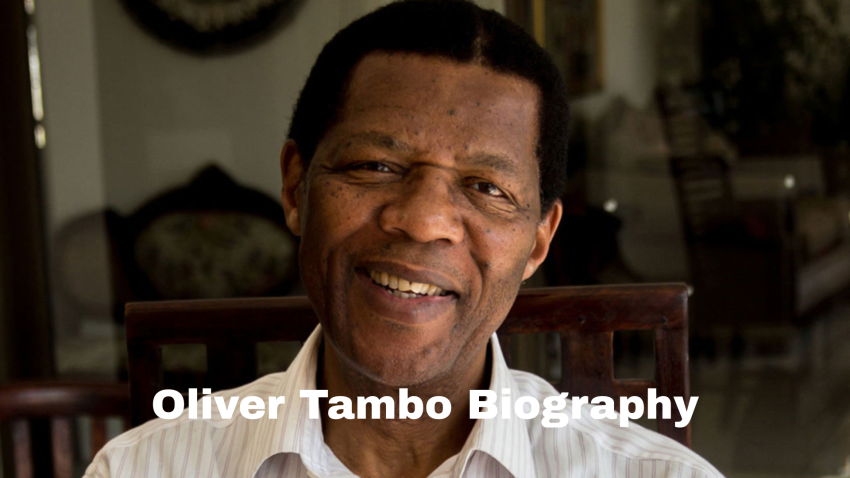Oliver Reginald Kaizana “OR” Tambo is one of South Africa’s towering liberation figures. Long before the end of apartheid, Tambo carried the ANC’s banner overseas, building diplomatic momentum, forging alliances, and keeping the anti-apartheid struggle alive while living in exile.
This biography traces his early life, rise in the ANC, partnership with Nelson Mandela, years in exile, return, and enduring legacy.
Early life and education
Oliver Tambo was born on 27 October 1917 in the rural village of Kantillo (Bizana) in the Mpondoland area of the Eastern Cape (now in the Eastern Cape province). Raised in a family that valued both traditional Xhosa culture and Western missionary education, he excelled at school and won a scholarship that helped shape his future.
Tambo studied at the University of Fort Hare, a key training ground for black South African leaders, where he became active in student politics and met peers who would later become lifelong colleagues in the liberation movement. After Fort Hare he worked as a teacher and then trained as a lawyer — the legal profession would become an early platform for fighting injustice.
Mandela & Tambo — the law firm and early activism
In late 1952 Oliver Tambo and Nelson Mandela opened a law practice in Johannesburg — Mandela & Tambo — the first black law firm partnership that became a legal refuge for many black South Africans seeking representation under apartheid laws. The office, at Chancellor House, served as a political anchor as much as a legal practice: lawyers defended those targeted by segregationist legislation and organized political campaigns.
Tambo’s legal training and organizational skills propelled him into national politics. He rose quickly through the ranks of the African National Congress (ANC), the primary liberation movement fighting racial discrimination and segregation.
Rise inside the ANC and leadership in exile
By the late 1950s Tambo had become an ANC national leader. After the Sharpeville massacre and subsequent crackdown in 1960, many ANC leaders were detained or faced bans. Tambo went into exile to maintain ANC structures and coordinate international support — a decision that allowed the movement to survive when internal leadership was being decimated. He spent more than 30 years in exile (1960–1990), traveling the world to secure diplomatic recognition, arms and training for the ANC’s freedom fighters, and humanitarian support for the cause.
Tambo served as President of the ANC from 1967 until 1991, shaping strategy and keeping hope alive for millions of oppressed South Africans. He was admired both for his intellect and for the patient, steady stewardship he provided while the ANC operated from abroad.
International campaigning — diplomacy and coalition building
Operating from bases in countries across Africa and in London, Tambo turned the ANC into a global anti-apartheid brand. He lobbied governments, influenced the United Nations and other international organizations, and cultivated solidarity movements in Europe, Asia, and the Americas. Under his leadership, the ANC gained diplomatic legitimacy, economic pressure on South Africa increased, and international support for sanctions and cultural boycotts grew. Those international levers proved decisive in isolating the apartheid regime.
Strategy and the shift in tactics
Tambo’s years of leadership encompassed difficult strategic choices. While the ANC had long favored non-violent protest, the brutal repression of the 1950s and 1960s led the organization to embrace armed struggle (e.g., the formation of uMkhonto we Sizwe). Throughout, Tambo emphasized a mixture of political, military, and diplomatic pressure — and he worked to keep the ANC united despite factional pressures and the difficulties of exile.
Return home and final years
With the unbanning of the ANC and the release of Nelson Mandela and other leaders around 1990, Tambo returned to South Africa after three decades abroad. He handed over day-to-day leadership as the ANC prepared for negotiations and for the transition to democratic rule. Tambo’s health, however, had suffered over years of travel and strenuous duty; he died in April 1993 in Johannesburg. His return and death both occurred at a historic moment — just months before South Africa’s first democratic elections in 1994.
Legacy and honors
- He is remembered as a diplomatic architect of the anti-apartheid campaign who internationalized the struggle and kept the ANC functioning while it was banned.
- Institutions, streets, and monuments bear his name — for example, OR Tambo International Airport in Johannesburg honours his contributions.
- His patient leadership style helped bridge armed and political strategies that ultimately brought about negotiated transition.
Frequently Asked Questions (FAQs)
Who was Oliver Tambo?
Oliver Tambo was a South African anti-apartheid activist, lawyer, and leader of the ANC who organized the movement in exile and helped internationalize the struggle.
When and where was he born?
He was born on 27 October 1917 in Bizana, in the Eastern Cape.
Did he work with Nelson Mandela?
Yes: Tambo and Mandela formed the Mandela & Tambo law firm in 1952 — South Africa’s first black law partnership.
How long was he in exile?
Approximately three decades (1960–1990).
What is Tambo’s lasting impact?
Tambo’s diplomacy, organizational leadership, and role in internationalizing the anti-apartheid movement were crucial to building global pressure that helped bring apartheid to an end.
Conclusion
Oliver Tambo’s life was defined by steadfast commitment: to principle, to comrades, and to the long, sometimes painful work of liberation.
While fighting at home often meant imprisonment or death for others, Tambo’s exile enabled him to build the international bridges that isolated apartheid and created the conditions for negotiated transition.
Today, his name is etched into South Africa’s institutions and memory — a reminder that behind every successful movement are organizers who quietly keep the cause alive through strategy, diplomacy, and resolve.
